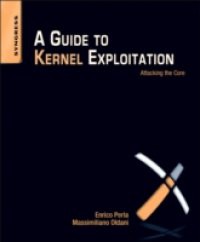A Guide to Kernel Exploitation: Attacking the Core discusses the theoretical techniques and approaches needed to develop reliable and effective kernel-level exploits, and applies them to different operating systems, namely, UNIX derivatives, Mac OS X, and Windows. Concepts and tactics are presented categorically so that even when a specifically detailed vulnerability has been patched, the foundational information provided will help hackers in writing a newer, better attack; or help pen testers, auditors, and the like develop a more concrete design and defensive structure. The book is organized into four parts. Part I introduces the kernel and sets out the theoretical basis on which to build the rest of the book. Part II focuses on different operating systems and describes exploits for them that target various bug classes. Part III on remote kernel exploitation analyzes the effects of the remote scenario and presents new techniques to target remote issues. It includes a step-by-step analysis of the development of a reliable, one-shot, remote exploit for a real vulnerabilitya bug affecting the SCTP subsystem found in the Linux kernel. Finally, Part IV wraps up the analysis on kernel exploitation and looks at what the future may hold.Covers a range of operating system families - UNIX derivatives, Mac OS X, WindowsDetails common scenarios such as generic memory corruption (stack overflow, heap overflow, etc.) issues, logical bugs and race conditionsDelivers the reader from user-land exploitation to the world of kernel-land (OS) exploits/attacks, with a particular focus on the steps that lead to the creation of successful techniques, in order to give to the reader something more than just a set of tricks

